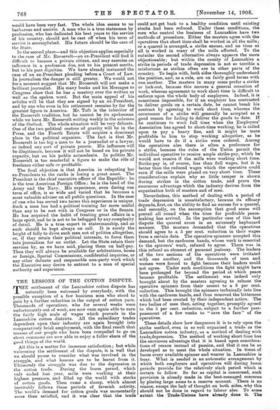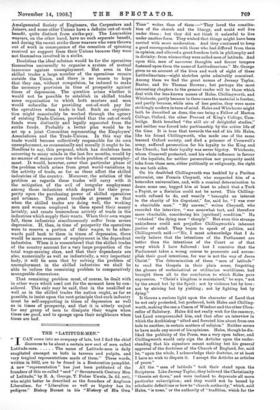THE LESSONS OF THE COTTON DISPUTE. T HE settlement of the
Lancashire cotton dispute has naturally been welcomed by everybody, with the possible exception of a few business men who stood to gain by a further reduction in the output of cotton yarn. Thousands of operatives, who for several weeks were unfortunately out of work, are now once again able to earn the fairly high scale of wages which prevails in the Lancashire cotton districts. All the subsidiary trades dependent upon their industry are again brought into comparatively brisk employment, with the final result that masses of our people who have been compelled to go on short commons are now able to enjoy a fuller share of the good timings of the world.
All this is a matter for immense satisfaction ; but while welcoming- the settlement of the dispute, it is well that we should cause to consider what was involved in the struggle, and what lessons are to be learnt from it. Ultimately time struggle was due to the depression in the cotton trade. During the boom period, which only ended last year, mills were working at their highest pressure, and filled up the world with stocks of cotton goods. Then came a slump, which almost inevitably follows these periods of feverish activity. The world's demand for cotton goods was momentarily more than satisfied, and it , was clear that the trade could not get back to a healthy condition until existing stocks had been reduced. Under these conditions, the men who control the business of Lancashire have two methods of procedure. Either the masters agree with the operatives that short time shall be worked in all the mills ; or a quarrel is arranged, a strike ensues, and no time at all is worked in many of the mills affected. To the outsider the second alternative always appears the more objectionable; but within the county of Lancashire a strike in periods of trade depression is not so terrible a misfortune as strikes often are in other parts of the country. To begin with, both sides thoroughly understand the position, and, as a rule, are on fairly good terms with one another. The masters in many cases prefer a strike or lock-out, because this secures a general cessation of work, whereas agreement to work short time is difficult to enforce upon the whole body of employers. Indeed, it is sometimes impossible, for if an employer has contracted- to deliver goods on a certain date, be cannot break his contract by agreeing to work short time, whereas the occurrence of a strike will generally be accepted as a good reason for failing to deliver the goods to date. If he continues to work full time when the Employers' Association has agreed to short-time working, he is called upon to pay a heavy fine, and it might be more profitable to him to stop working altogether, as he would have to do if a strike were ordered. Among the operatives also there is often a preference for a strike, because time rules of the Union permit the individual operative to receive ample strike-pay, which he- would not receive if the mills were working short time. Strike-pay is, of course, less than full wages, but it is. better than the reduced wages which the operative could earn if the mills were placed on very short time. These considerations explain why so little temper is shown during strikes in the cotton trade, and prove the enormous advantage which the industry derives from the organisation both of masters and of men.
Nevertheless, this method of dealing with a period of trade depression is unsatisfactory, because its efficacy depends, first, on the ability to find an excuse for a quarrel, and secondly, on the assumption that good sense will prevail all round when the time for profitable peace- making has arrived. In the particular case of this last dispute the quarrel arose in an extremely haphazard manner. The masters demanded that the operatives should agree to a 5 per cent. reduction in their wages from a certain date. The operative spinners accepted this demand, but the cardroom hands, whose work is essential to the spinners' work, refused to agree. There was in this refusal an element of personal jealousy. The leaders of the two sections of the operatives were irritated with one another, and the thousands of men and women were forced to fight because their leaders could not agree. Under such conditions the fight might have been prolonged far beyond the period at which peace became profitable. The settlement was indeed only brought about by the masters agreeing to release the operative spinners from their assent to a 5 per cent. reduction. This brought the spinners technically into line with the cardroom hands, and thus removed the bitterness which had been created by their independent action. The two bodies of men then, acting together, promptly agreed. to the 5 per cent. reduction, subject to a further post- ponement of a few weeks to " save the face" of the operatives.
These details show how dangerous it is to rely upon the strike method, even in so well organised a trade as the Lancashire cotton industry, as a method of dealing with trade,depression. The method of working short time has the enormous advantage that it is based upon considera- tions of reason instead of passion, and that it can be so developed as to meet the whole situation. in times of boom every available spinner and weaver in Lancashire is busy. What is needed is an automatic arrangement by which both employers and operatives will during boom periods provide for the relatively slack period which is certain to follow. So far as capital is concerned, such provision is already made in the best-managed concerns by placing large sums to a reserve account. There is no reason, except the lack of thought on both sides, why this should not be done in regard to labour also. To some extent the Trade-Unions have already done it. The Amalgamated Society of Engineers, the Carpenters and Joiners, and some other Unions have a definite out-of-work benefit, quite distinct from strike-pay. The Lancashire weavers, on the other hand, have no such separate benefit, and during the recent strike those weavers who were thrown out of work in consequence of the cessation of spinning received no support from their Unions because they were not themselves involved in a strike.
Doubtless the ideal solution would be for the operatives themselves universally to organise a system of mutual insurance against unemployment. But even in the skilled trades a large number of the operatives remain outside the Union, and there is no reason to hope that they can, without compulsion, be induced to make the necessary provision in time of prosperity against times of depression. The question arises whether it would not be possible to establish in skilled trades some organisation to which both masters and men would subscribe for providing out-of-work pay for the operatives when trade is bad. Such an organisa- tion might conceivably be worked through the agency of existing Trade-Unions, provided that the out-of-work funds were distinctly and legally separated from the strike funds. Probably a better plan would be to set up a joint Committee representing the Employers' Associations and the Trade-Unions. In this way the trade would become collectively responsible for its own unemployment, as economically and morally it ought to be. Needless to say, this proposal, which has doubtless been occurring to many minds in the last few months, would by no manner of means cover the whole problem of unemploy- ment. It would, however, cover that particular phase of the problem which arises from great world-variations in the activity of trade, so far as these affect the skilled industries of the country. Moreover, the solution of the problem as regards these trades will carry with it the mitigation of the evil of irregular employment among those industries which depend for their pros- perity upon the purchasing power of skilled operatives and artisans. The great trouble at present is that when the skilled trades are doing well, the working men and women employed in them spend their money lavishly, and create tremendous activity of trade in the industries which supply their wants. When their own wages fall, these industries simultaneously suffer from severe depression. If, then, in time of prosperity the operatives were to reserve a portion of their wages, to be after- wards paid back to them in times of depression, there would be more evenness of employment in the dependent industries. When it is remembered that the skilled trades of the country account for a very large proportion of the total wage-earning class, and that their dependents are also, numerically as well as industrially, a very important body, it will be seen that by solving the problem of unemployment in the skilled industries we shall be able to reduce the remaining problem to comparatively manageable dimensions.
That remaining problem must, of course, be dealt with in other ways which need not for the moment here be con- sidered. This only may be said, that in the unskilled as well as in the skilled trades the nation ought, as far as possible, to insist upon the root-principle that each industry must be self-supporting in times of depression as well as in times of prosperity, and that it is utterly unjust for any group of men to dissipate their wages when times aye good, and to sponge upon their neighbours when times are bad.











































 Previous page
Previous page